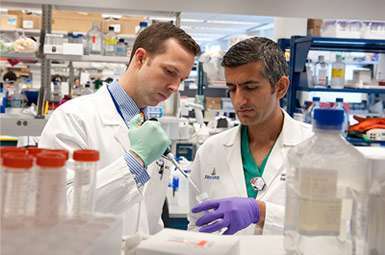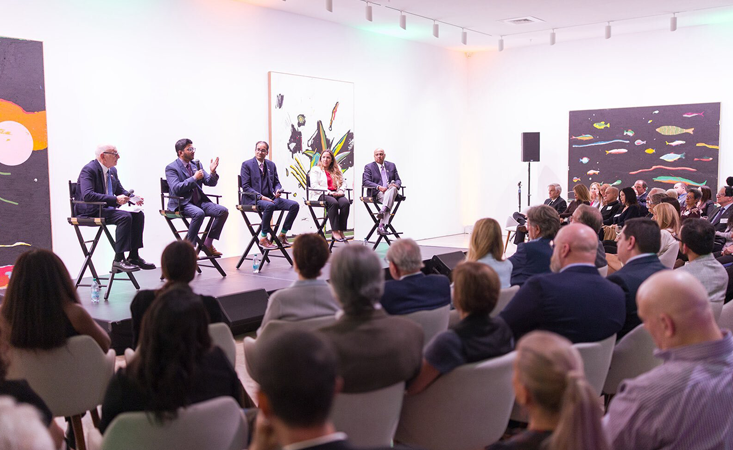
Pancreatic Cancer Action Network Awards Coveted Pancreatic Cancer Research Grants to Promising Early-Career Scientists
Grants awarded by the Pancreatic Cancer Action Network in partnership with the American Association for Cancer Research to accelerate research progress
MANHATTAN BEACH, Calif. (April 4, 2017) – The Pancreatic Cancer Action Network (PanCAN), in partnership with the American Association for Cancer Research (AACR), awarded four grants to outstanding scientists who will undertake novel pancreatic cancer research to improve patient outcomes.
Since 2003, the Pancreatic Cancer Action Network has awarded more than $35 million to support 142 grants to 143 promising scientists and researchers at 55 institutions across the country.
“By recruiting the brightest scientists with the most innovative ideas, we continue to build a broad research community whose critical work in basic and translational research may foster clinical outcomes,” said Julie Fleshman, JD, MBA, president and CEO of the Pancreatic Cancer Action Network. “This is a key part of our urgent mission and comprehensive strategy to accelerate research and double patient survival by 2020.”
The 2017 Pancreatic Cancer Action Network-AACR Pathway to Leadership Grants are awards of up to a five-year duration totaling $600,000. These grants are designed to support the future leadership of pancreatic cancer research by funding outstanding early-career investigators in a postdoctoral, mentored research position and continuing through successful transition to independence. This year’s recipient is:
• Luisa Escobar-Hoyos, MSc, PhD, Memorial Sloan Kettering Cancer Center
“mRNA Splicing in Pancreatic Adenocarcinoma”
The 2017 Pancreatic Cancer Action Network-AACR Career Development Awards are two-year grants of $200,000 that are designed to attract and support early-career scientists as they conduct pancreatic cancer research and establish successful career paths in the field. This year’s recipients are:
• Vinod Balachandran, MD, Memorial Sloan-Kettering Cancer Center
“Characterization of the Antigen Landscape in Human Pancreatic Cancer”
• Ingunn Stromnes, PhD, Fred Hutchinson Cancer Research Center
“Enhancing Efficacy of Engineered T Cell Therapy for Pancreatic Cancer”
• Haoqiang, Ying, MD, PhD, University of Texas MD Anderson Cancer Center
“The Regulation of Oncogene Addiction by YAP Pathway in Pancreatic Cancer”
Grant recipients are selected through a competitive peer-review process, and grantees receive professional support as part of the Pancreatic Cancer Action Network’s Community for Progress in conjunction with their funding.
Pancreatic cancer patients have the lowest five-year survival rate of any major cancer, at just nine percent. While the survival rate has increased for the third consecutive year, pancreatic cancer is projected to become the second leading cause of cancer-related death in the United States by 2020, according to research conducted by the Pancreatic Cancer Action Network and published in Cancer Research, a journal of the AACR.
The Pancreatic Cancer Action Network is accelerating the pace of research progress for the nation’s deadliest major cancer. The organization’s urgent mission is to improve outcomes for patients battling the disease today and to double pancreatic cancer survival by 2020 through its key initiatives Precision PromiseSM, Know Your Tumor® and the Patient Registry.
In summer 2017, the organization will announce additional grantees who will accelerate novel treatments and early detection for pancreatic cancer. Learn more about the organization’s research grants program, funding opportunities and past grantees.
About the Pancreatic Cancer Action Network
The Pancreatic Cancer Action Network (PanCAN) is accelerating the pace of research progress for one of the world’s deadliest cancers. With an urgent mission to improve outcomes for pancreatic cancer patients and double survival by 2020, the organization, founded in 1999, executes a bold and comprehensive strategy to Wage Hope through research, patient services, advocacy and community engagement. The organization’s visionary goals, world-class programs and services, extensive grassroots network, patient-focused outcomes and advisory board of scientific and medical leaders provide the critical backdrop to help pancreatic cancer patients today and create transformational change for all patients in the future.














